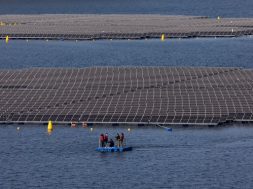
Tesla’s Musk Floats Goal of Producing Solar Roofs at a Rate of ‘1,000 a Week’ by Year’s End

Analysts say the target is unrealistic with the Gigafactory 2 still under construction in upstate New York.
Tesla CEO Elon Musk dropped another eye-catching tweet this week, this time announcing an ambitious target for solar roof production that analysts say looks improbable.
Tesla executives made no mention of the solar roof during the company’s second-quarter earnings call last week, but Musk followed up with a tweet that the company will be “spooling up production line rapidly” and hopes to turn out about 1,000 solar roofs per week by the end of this year.
Progress on Tesla’s solar roof deployment has so far been difficult to quantify. During the June shareholder meeting, Musk reported that the product was being installed in eight states. But the latest data from investor-owned utilities in California, Tesla’s home base and one of its largest markets, suggests only about 31 solar roofs had been installed in that state through the end of April. Tesla has declined to comment on the California number or on how many solar roofs it’s currently producing each week.
Austin Perea, a senior solar analyst at Wood Mackenzie Power & Renewables, categorized the 1,000-per-week target as near-impossible to meet, especially in light of the relatively low deployments of the product to date.
“Elon Musk will put a man on Mars before he produces 1,000 solar roofs per week by end of year,” said Perea.
California’s new home solar mandate, which goes into effect in 2020, could provide a slight boost to demand for Tesla’s product, Perea said. But Tesla has already seen healthy demand for the solar roof, with production issues remaining the chief bottleneck.
In its most recent filing with the Securities and Exchange Commission, Tesla noted it still had not completed construction at its Gigafactory 2 in upstate New York, where it produces the solar roof. The company plans to scale up production through 2019 and into 2020.
In April, Greentech Media reported on struggles at that Gigafactory. In May, Tesla said it would start producing certain energy storage and electric vehicle products at the plant in addition to solar products.
Turmoil and confusion surrounding the solar roof appears to be leaking into Tesla’s solar business at a wider scale. In Q3 2018, Sunrun overtook Tesla on residential installations. In Q2 2019, Tesla recorded its lowest quarter in terms of solar deployments to date at 29 megawatts. SolarCity’s deployments peaked at 650 megawatts in 2016, according to data from WoodMac.
In a Q2 letter to investors, Tesla said it’s “in the process of improving many aspects of this business to increase deployments.”
The company’s precipitous drop in installations of late means that if Tesla did achieve its 1,000-per-week goal, solar roof production and installation would equate to a significant portion of the company’s overall deployments.
Tesla has made numerous changes to its solar business in recent months, slashing sales channels and directing most of its business to online purchases. In April, the company unveiled more “big changes,” announcing it would only sell residential systems in increments of 4 kilowatts. Tesla asserted that the modular approach, which also delegated some pre-installation work to customers, would reduce systems costs.
In some areas of its business, Tesla has a track record of beating expectations: In July the company reached a production goal of 5,000 Model 3s per week, in part by building an additional assembly line in a tent (and amid news of underreported workplace injuries and unsafe conditions).
But with its top position ceded to Sunrun and just 29 megawatts of solar deployed in the second quarter, evidence appears to be mounting that Tesla’s successes as an automaker may not translate to its solar business.
















